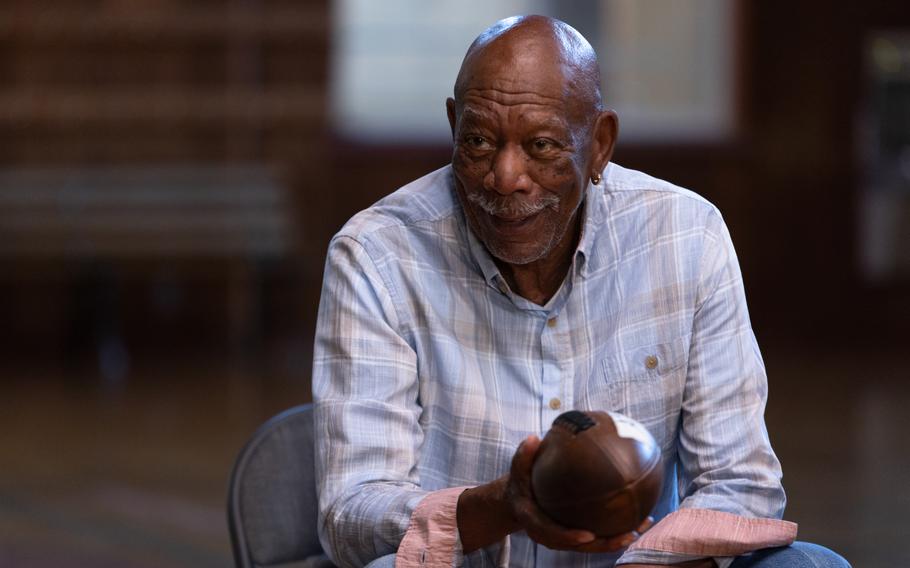
From left: actors Ed Harris, Natalie Morales and Sonequa Martin-Green as seen in the drama film “My Dead Friend Zoe.” (Briarcliff Entertainment)
Morgan Freeman is just one of the many veterans that make up 90% of the cast in “My Dead Friend Zoe,” a comedy-drama that was directed by an Army veteran and produced by Kansas City Chiefs star Travis Kelce.
It opens in theaters Feb. 28.
The film follows a female Army veteran named Merit, played by “The Walking Dead” and “Star Trek: Discovery” star Sonequa Martin-Green, as she reconnects with her veteran grandfather (played by Ed Harris of “Apollo 13” and “The Truman Show”) and struggles with attending mandatory therapy sessions despite the pleas of her VA counselor (Morgan Freeman). Throughout the film Merit is haunted by her dead friend, the titular Zoe (Natalie Morales).
It premiered at SXSW Film Festival in 2024, where it received the Audience Award, and has a 100% rating on Rotten Tomatoes with 19 critics weighted at the time of this writing.
Veterans deliver unscripted lines next to Morgan Freeman
Aside from Freeman, who served in the U.S. Air Force from 1955 to 1959, most of the primary cast have not served in the military. But even as minor characters, the veterans cast in the movie play an important role in recurring scenes of Department of Veterans Affairs group therapy sessions.
The scenes follow Merit’s struggle to open up about her experiences since leaving Afghanistan but also show other veterans opening up. Their lines were not only entirely unscripted, but true stories, director Kyle Hausmann-Stokes told Stars and Stripes.
“They had to play opposite Morgan Freeman with no script. But I knew they’d be up for it, and they did a great job,” Hausmann-Stokes said.

Actor and U.S. Air Force veteran Morgan Freeman plays the role of a VA counselor in the movie “My Dead Friend Zoe,” directed by Army veteran Kyle Hausmann-Stokes. (Briarcliff Entertainment)
The presence of veterans on set was also helpful and inspiring for lead actor Martin-Green, who told Stars and Stripes that she listened closely to her castmates’ stories.
Although several members of Martin-Green’s family have served, she said that playing Merit was a challenge because so much of it was outside of her own experience. But she was able to ask and learn from the veterans on set, and the director provided her with a lot of footage of veterans discussing their journeys.
A rare depiction of female veterans
Although the story revolves around a female Army veteran and her dead friend, it is heavily based on the experience of the director and his male platoonmates — who were in the Army at a time when women were not allowed to serve in ground combat roles.
Hausmann-Stokes, who received a Bronze Star for his combat tour in Iraq, said he was determined from the outset to tell a story that centered female service members because of his post-service experience chronicling veterans’ mental health stories for the VA.
“I interviewed hundreds of veterans over the course of four years in every major city across the U.S. And half of those were women,” he said. “And I was completely blown away by their stories and their courage and how they had done all the same things as the men I had spoken with, and then some. So I kind of made a deal with myself at that point.”
The dynamic was also applauded by Kelce, an executive producer.
“Sonequa and Natalie bring depth and authenticity to their performances, highlighting the strength, resilience and leadership of women in the military,” Kelce said in a statement.
Exploring a generational divide
Another unique aspect of the dark comedy is its depiction of the divide between different generations of veterans.
The film closely follows Merit’s rocky relationships with two Vietnam veterans: her grandfather, recently diagnosed with Alzheimer’s, and her VA counselor.
Merit’s grandfather is heavily modeled after the director’s grandfather, who served in Vietnam.
“When I got back from Iraq, I kind of thought that he and I would have this conversation about our experiences, and we really didn’t,” Hausmann-Stokes said. “And it kind of revealed something to me about this schism between Vietnam veterans and my generation of veterans. Because they were the opposite of welcomed home, to put it mildly, and my generation was.”
“Most Vietnam veterans are kind,” Hausmann-Stokes was quick to note, adding that generational differences are hardly unique to veterans.
A unique funding model and nonprofit collaboration
Hausmann-Stokes and Martin-Green touted the film’s funding model. It was co-produced by Legion M, a fan-owned company that counts tens of thousands of people as shareholders and aims to support independent works.
Also of note is the film’s three “impact partners,” or nonprofits the audience is encouraged to support — The Bob Woodruff Foundation, The Mission Continues and Everytown for Gun Safety.
The film is using a unique Pay It Forward campaign, in which supporters can donate tickets and support community screenings via The Bob Woodruff Foundation.
Kaylyn Barnhart contributed to this report.